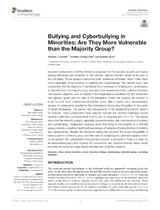Mostrar el registro sencillo del ítem
Bullying and Cyberbullying in Minorities: Are They More Vulnerable than the Majority Group?
| dc.contributor.author | Llorent García, Vicente J. | |
| dc.contributor.author | Zych, Izabela | |
| dc.contributor.author | Ortega Ruiz, Rosario | |
| dc.date.accessioned | 2017-07-26T08:41:17Z | |
| dc.date.available | 2017-07-26T08:41:17Z | |
| dc.date.issued | 2016 | |
| dc.identifier.uri | http://hdl.handle.net/10396/14961 | |
| dc.description.abstract | Inclusion in education of all the children is necessary for the success, equality and peace among individuals and societies. In this context, special attention needs to be paid to the minorities. These groups might encounter additional difficulties which make them more vulnerable to be involved in bullying and cyberbullying. The current study was conducted with the objective of describing the involvement in bullying and cyberbullying of students from the majority group and also from sexual and ethnic-cultural minorities. The second objective was to explore if the implication is predicted by the interaction with gender, grade and the size of the population where the schools are located. It is an ex post facto transversal descriptive study with a survey on a representative sample of adolescents enrolled in the Compulsory Secondary Education in the south of Spain (Andalusia). The survey was answered by 2139 adolescents (50.9% girls) in 22 schools. These participants were selected through the random multistage cluster sampling with the confidence level of 95% and a sampling error of 2.1%. The results show that the minority groups, especially sexual minorities, are more involved in bullying and cyberbullying. Regression analyses show that being in the majority or a minority group predicts a small but significant percentage of variance of being involved in bullying and cyberbullying. Results are discussed taking into account the social vulnerability of being a part of a minority group and the need of designing educational programs which would prevent this vulnerability thorough the inclusion in education. There is a need for an educational policy that focuses on convivencia and ciberconvivencia which would promote the social and educational development of all the students | es_ES |
| dc.description.sponsorship | Gobierno de España. PSI-2015-64114-R | es_ES |
| dc.format.mimetype | application/pdf | es_ES |
| dc.language.iso | eng | es_ES |
| dc.publisher | Frontiers in Psichology | es_ES |
| dc.rights | https://creativecommons.org/licenses/by/4.0/ | es_ES |
| dc.source | Frontiers in Psichology 7, 1507 (2016) | es_ES |
| dc.subject | Ethnic-cultural minorities | es_ES |
| dc.subject | Sexual minorities | es_ES |
| dc.subject | Bullying | es_ES |
| dc.subject | Ciberbullying | es_ES |
| dc.subject | Vulnerable groups | es_ES |
| dc.subject | Secondary education | es_ES |
| dc.title | Bullying and Cyberbullying in Minorities: Are They More Vulnerable than the Majority Group? | es_ES |
| dc.type | info:eu-repo/semantics/article | es_ES |
| dc.relation.publisherversion | https://doi.org/10.3389/fpsyg.2016.01507 | es_ES |
| dc.rights.accessRights | info:eu-repo/semantics/openAccess | es_ES |

